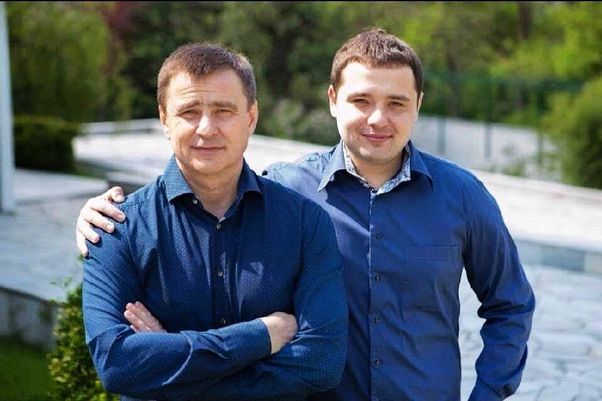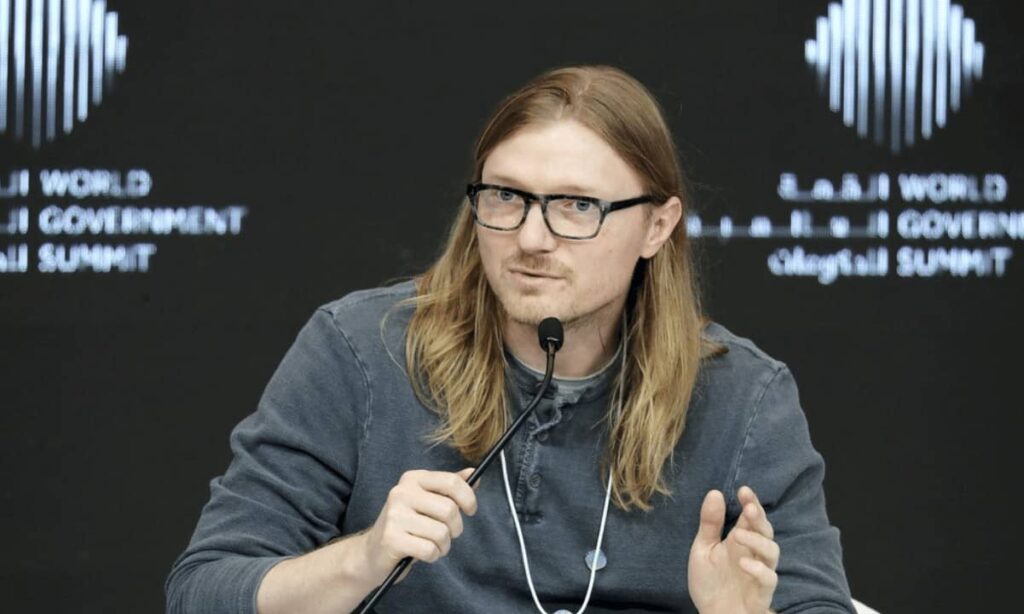WhiteBIT is the most prominent crypto exchange in Ukraine. It is constantly advertised and widely known. A lot of effort is put into developing the PR component. In 2022, WhiteBIT launched joint projects with the Ministry of Foreign Affairs, in particular, regarding the support of Ukrainian refugees. WhiteBIT has recently announced cooperation with the Ministry of Digital Transformation. The country’s main digital agency is launching free crypto literacy training together with this exchange.
Additionally, the owners of the crypto exchange are investing in sponsorship contracts with football clubs and our national team. The exchange became a sponsor of the Turkish football club Trabzonspor, paying 4.5 million euros for its logo to be displayed on the players’ shirts during 3 seasons.
Later, in December 2022, Whitebit signed a similar agreement with FC Barcelona, and shortly afterwards, in January 2023, with the Ukrainian national football team. The amounts of the last two deals were not disclosed.
All these steps should make this crypto exchange look interesting and encourage people to use it.
But in reality, there are a number of questions towards Whitebit, and I am pretty sure that at least one of them deserves to be investigated by the British National Crime Agency.
Who Stands Behind WhiteBIT?
According to the conventional wisdom, WhiteBIT was founded in 2018 by Volodymyr Nosov, a Kharkiv resident who used to sell parquet. He is the person who represents the crypto exchange, speaks on its behalf, and signs agreements.
However, in fact, the WhiteBIT group now includes at least 9 companies registered in different countries. The oldest of them in the Estonian jurisdiction is Whitebit Financial Company OÜ. It was registered at the time of the founding of the crypto exchange itself. This jurisdiction was highly popular among Ukrainian IT businesses in those years because of its convenient administration and low taxes.
Volodymyr Nosov created the company not alone, but jointly with three other people: his partners were Hanna Yankovska, Maria Repeshko, and Mykyta Shentsev.
Yes, the same Mykyta Shentsev who recently resigned his mandate as a deputy of the Kharkiv Regional Council from the OPFL. Moreover, according to the media, he was deprived of Ukrainian citizenship by President Volodymyr Zelenskyy. According to Censor.Net, Mykyta Shentsev is a citizen of Russia since 2014. However, the ex-deputy himself denies the claim.
As we know, Mykyta is the son of Dmytro Shentsev, a formerly influential former member of the Verkhovna Rada from Kharkiv region. The latter was a member of the Party of Regions, the Opposition Bloc, and eventually was elected from the OPFL in the last parliamentary elections. He resigned his mandate in the fall in 2022, and until then was considered to be a representative of the “Kharkiv” group of former Party of Regions members.
Another founder of the Estonian Whitebit, Maria Repeshko, works with Mykyta Shentsev in the legal business.
It is worth noting that over time, the list of beneficiaries of the Estonian crypto-exchange company has changed. There were new people, such as Hlib Ushakov, Nosov’s partner, or WhiteBIT’s vice president Oleksii Kovalev. All the while, however, the share of Mykyta Shentsev’s ownership was steadily increasing.
As of March 1, 2023, Shentsev controlled 51% of WhiteBIT Financial Company OÜ. Another 5% belonged to his partner Maria Repeshko. On March 2 this year, both Nikita Shentsev’s and Maria Repeshko’s shares were re-registered to Volodymyr Nosov.
This can only mean one thing: Whitebit was not only Volodymyr Nosov’s startup. An influential family of pro-Russian politicians from Kharkiv oblast, who has extensive ties, was involved in its formation, and until last month, its representatives controlled the company completely. It is quite possible that they still control it, through a new formal owner.
However, this is not the only suspicious connection of Whitebit, to put it mildly.
The financing of the attempted coup in Montenegro
Another crypto exchange structure registered in the UK is WhiteBIT Solutions LLP. The company is owned by two offshore founders – Whitebit LTD and Coddan Nominee.
These two companies are registered in the same room in the Seychelles. The offshore registrar Nobel Capital Group also operates there.
This is where the most interesting part begins.
Coddan Nominee acts not only as a co-founder of a large crypto exchange company that cooperates with the Ukrainian authorities. Researchers consider Coddan an important component of an extensive offshore network. However, exactly what kind of network is it?
In 2014-2016, Coddan was the founder of Sofbiz.
According to “Radio Svoboda” (Radio Liberty), this company transferred one and a half million euros to the organizers of the failed coup in Montenegro in October 2016. According to Montenegrin investigators, these funds were intended for the assassination of the former Prime Minister and current President of Montenegro, Milo Đukanović.
As stated by Montenegro’s Special Prosecutor Sasha Chadenovic that summer in 2019, the funds transferred by the company first went to bank accounts in Cyprus, and only then were transferred to a group of people involved in the coup attempt. The aim of the coup, according to the investigation, was to prevent Montenegro from joining NATO and ensure that pro-Russian forces would take control.
An investigation by the Bellingcat group and its Russian partner The Insider found that CIO (Chief Intelligence Office) officers of the Russian General Staff, Eduard Shishmakov and Volodymyr Moiseev, were behind the coup attempt. It was they who organized work with pro-Russian politicians in Montenegro and involved Serbian citizens in this coup attempt.
At the same time, the same CIO officers were also involved in recruiting Serbs for the war against Ukraine in Donbas and helped in organizing intelligence for terrorists from the so-called “DPR”.
Taking into account these relations, the conclusion is quite obvious – the aforementioned “Seychelles” offshore network can be controlled by the Russian CIO and used to finance its terrorist operations around the world.
One of the elements of this network, Coddan, was not dismantled even after it became a part of an international scandal concerning coup attempts in a European country. More importantly, in 2020, he suddenly appears among the founders of a major crypto exchange connected to Ukrainian pro-Russian figures. How was this possible? I sent an inquiry to the British National Crime Agency regarding this matter, but by the time of the publication of this article, I have not yet received a response.
Money laundering
A few days ago, at the end of March 2023, Russian IT journalists noticed the movement of a large amount of money (about $88 million) in bitcoin associated with the Russian crypto exchange BTC-e.
These bitcoins remained unchanged since November 2022, and in summer 2022, the founder of the BTC-e exchange, Russian Oleksandr Vinnyk, was extradited to the United States with a possible 55-year prison sentence for financial fraud and laundering $4 billion.
Some representatives of the Russian crypto market were outraged by the fact that, according to them, part of this amount, about $12 million, was transferred to the supposedly Ukrainian exchange Whitebit.
Should this be true, it means that Whitebit is still working with Russia, and with the money of a person whom the FBI intends to imprison for the rest of his life.
On Patrushev’s table
In addition to the fact that the crypto exchange itself can be a much more convenient tool for financing mercenaries or politicians than international transfers, it also attracts a large number of users. They often strongly believe in the anonymity of their cryptocurrency transactions.
This is especially true when they use the products of a seemingly completely “white” trendy startup that helps Ukrainian refugees and, together with the Ministry of Digital Transformation, trains them in crypto literacy.
These users do not even suspect that not only Russians or pro-Russian politicians, but the Russian CIO itself may operate inside this structure. And all customer transfers can be accessed at any time by the apparatus of the Kremlin’s supervisor of Russian special services, Mykola Patrushev.
We should not forget that at a time when the Ukrainian government is trying its best to block any Russian influence in Ukraine, the Russian General Staff can go behind its back under attractive and fashionable signs.
Considering this, the activities and origins of the Whitebit crypto exchange deserve at least the interest of the Security Service of Ukraine and other competent authorities. And at the very least, it deserves an international investigation, with the involvement of the UK and Montenegro’s intelligence services.













